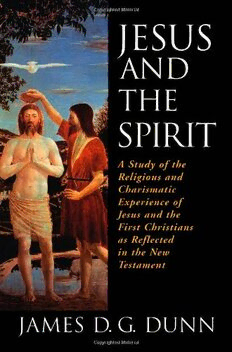
Jesus and the Spirit: A Study of the Religious and Charismatic Experience of Jesus and the First Christians as Reflected in the New Testament PDF
529 Pages·1997·30.264 MB·English
Most books are stored in the elastic cloud where traffic is expensive. For this reason, we have a limit on daily download.
Preview Jesus and the Spirit: A Study of the Religious and Charismatic Experience of Jesus and the First Christians as Reflected in the New Testament
Description:
In understanding early Christianity (i.e. Jesus and the first Christians), the N.T. materials can be analyzed in their various dimensions (e.g., historical, theological, experiential, etc.). What N.T. Wright has provided for us by way of his treatment of the second-temple Jewish, historical background of Jesus and the first Christians, Dunn has done for us via his treatment of the experiential dimension. This is not to "reduce" their faith to subjective experiences, but to show how their relation to God was reflected in their various experiences of God's Spirit. This helps us to discover in what ways Jesus' own experiences were distinctive (or unique), and, at the same time, like those of the first believers.One of the major points Dunn brings out is, that both Jesus' and the first Christian's experience of the Spirit was "eschatological" in nature: they experienced an outpouring of the Spirit and understood themselves to be living, now, in the new age to come. This awareness, on Jesus' part, led him to understand himself as the one who was bringing in the kingdom of God, as his Son, and manifested itself in the first believers as a full and diversified experience of the Spirit, which was determinative for every aspect of their lives, not least in their worship. Dunn discusses the various charismata and admonitions by Paul, in responding to the disruptions in the Corinthian church, to safeguard against their misuse.One of the major claims in his book is, that in the resurrection appearances to the apostles, the experience included a commission to proclaim the gospel--this, he maintains, was one of the "distinctive" features of the resurrection appearances. In this interpretation, of course, Dunn is trying to explain the experiential basis for the apostolic authority. Dunn also stresses the "not yet" side of the Christian experience, and interprets Paul's comments in Romans 7 in these terms: the Christian experiences the tension caused by still living within the present age (a point Gordon Fee has challenged in his writings). In this regard, Dunn has an excellent discussion of Paul's stress on sharing (and glorying) in the suffering of Christ--it is precisely through sharing in his (Jesus') death that we may be conformed to his life. This, for Paul, was the basis of his gospel and in what he gloried.Dunn displays an obvious appreciation of the charismatic nature of the life of the first Christains, and on several occasions cautions against simply "reading off" or dismissing the Spirit phenomena witnessed in the N.T. While he does not argue for accepting each particular incident of a "miracle" story, nevertheless, he maintains that we need to remain objective in our evaluation of such phenomena and not arbitrarily dismiss them on the basis of a supposed more enlightened modern view.This work is one of the few of its kind, and provides another important interpretative dimension to help us understand the origin of Christian faith and actual experiences of Jesus and the first Christians. It is a very sensitive and objective treatment, and has direct relevance to Christological study in particular.
See more
The list of books you might like
Most books are stored in the elastic cloud where traffic is expensive. For this reason, we have a limit on daily download.
